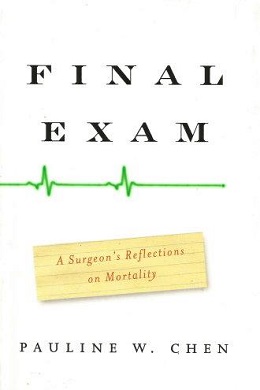Final Exam: A Surgeon's Reflections on Mortality
Final Exam: A Surgeon's Reflections on Mortality is a book written by Pauline W. Chen, a surgeon who explores the complex relationship between doctors and the concept of mortality. The book provides a profound insight into the emotional and ethical challenges faced by medical professionals when dealing with death and dying.
Overview[edit | edit source]
Final Exam is a reflective narrative that delves into the personal experiences of Dr. Chen as she navigates her career in medicine. The book is structured around her journey from medical school to becoming a practicing surgeon, highlighting the moments that shaped her understanding of mortality.
Dr. Chen discusses the often unspoken aspects of medical training, where the focus is primarily on saving lives, sometimes at the expense of acknowledging the inevitability of death. She argues that this can lead to a lack of preparedness among doctors when dealing with terminally ill patients.
Themes[edit | edit source]
Mortality in Medicine[edit | edit source]
A central theme of the book is the confrontation with mortality that every doctor must face. Dr. Chen emphasizes the importance of acknowledging death as a natural part of life and the role of healthcare professionals in providing compassionate care to those at the end of life.
Empathy and Compassion[edit | edit source]
Dr. Chen advocates for greater empathy and compassion in the medical field. She shares stories of patients and their families, illustrating the profound impact that a caring and understanding approach can have on those facing the end of life.
Medical Education[edit | edit source]
The book critiques the traditional medical education system, which often prioritizes technical skills over emotional intelligence. Dr. Chen calls for a more holistic approach to training doctors, one that includes preparing them to deal with the emotional aspects of patient care.
Impact[edit | edit source]
Final Exam has been praised for its candid and heartfelt exploration of a topic that is often avoided in medical discourse. It has sparked discussions about the need for reform in medical education and the importance of addressing the emotional well-being of both patients and healthcare providers.
Related pages[edit | edit source]
Search WikiMD
Ad.Tired of being Overweight? Try W8MD's physician weight loss program.
Semaglutide (Ozempic / Wegovy and Tirzepatide (Mounjaro / Zepbound) available.
Advertise on WikiMD
|
WikiMD's Wellness Encyclopedia |
| Let Food Be Thy Medicine Medicine Thy Food - Hippocrates |
Translate this page: - East Asian
中文,
日本,
한국어,
South Asian
हिन्दी,
தமிழ்,
తెలుగు,
Urdu,
ಕನ್ನಡ,
Southeast Asian
Indonesian,
Vietnamese,
Thai,
မြန်မာဘာသာ,
বাংলা
European
español,
Deutsch,
français,
Greek,
português do Brasil,
polski,
română,
русский,
Nederlands,
norsk,
svenska,
suomi,
Italian
Middle Eastern & African
عربى,
Turkish,
Persian,
Hebrew,
Afrikaans,
isiZulu,
Kiswahili,
Other
Bulgarian,
Hungarian,
Czech,
Swedish,
മലയാളം,
मराठी,
ਪੰਜਾਬੀ,
ગુજરાતી,
Portuguese,
Ukrainian
Medical Disclaimer: WikiMD is not a substitute for professional medical advice. The information on WikiMD is provided as an information resource only, may be incorrect, outdated or misleading, and is not to be used or relied on for any diagnostic or treatment purposes. Please consult your health care provider before making any healthcare decisions or for guidance about a specific medical condition. WikiMD expressly disclaims responsibility, and shall have no liability, for any damages, loss, injury, or liability whatsoever suffered as a result of your reliance on the information contained in this site. By visiting this site you agree to the foregoing terms and conditions, which may from time to time be changed or supplemented by WikiMD. If you do not agree to the foregoing terms and conditions, you should not enter or use this site. See full disclaimer.
Credits:Most images are courtesy of Wikimedia commons, and templates, categories Wikipedia, licensed under CC BY SA or similar.
Contributors: Prab R. Tumpati, MD

